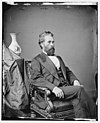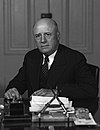Texas's 4th congressional district
| Texas's 4th congressional district | |
|---|---|
 District map | |
| Representative | |
| Distribution |
|
| Population (2023) | 845,835[2] |
| Median household income | $93,729[2] |
| Ethnicity |
|
| Cook PVI | R+16[3] |
Texas's 4th congressional district of the United States House of Representatives is in an area of Northeast Texas, that includes some counties along the Red River northeast of the Dallas/Fort Worth Metroplex, as well as some outer eastern suburbs of the Metroplex. Austin College in Sherman, Texas is located within the district. As of 2017, the 4th district represents 747,188 people who are predominantly white (80.8%) and middle-class (median family income is US$56,062, compared to $50,046 nationwide).[2] It is currently represented by Pat Fallon.
District
[edit]All or portions of the following counties are in the 4th congressional district since 2023:[4]
- Bowie County (part)
- Collin County (part)
- Delta County
- Denton County (part)
- Fannin County
- Grayson County
- Hopkins County
- Hunt County (part)
- Lamar County
- Rains County
- Red River County (part)
- Rockwall County
History
[edit]Texas has had at least four congressional districts since the State's senators and representatives were re-seated in Congress after the Civil War.[5] The district's current configuration is dated from 1903. It has traditionally given its congressmen very long tenures in Washington; only six men have represented it since then.
Once a reliably Democratic district, the district swung rapidly into the Republican column at the federal level as Dallas' suburbs spilled into the western portion of the district. In fact, it has not supported a Democrat for president since 1964. However, as late as 1996, Bill Clinton carried ten of the sixteen counties that are currently in this district; many of those counties were in the 1st district at the time. Additionally, conservative Democrats continued to hold most of the district's local offices well into the 2000s.
For many years, it was based in Tyler, but a controversial 2003 redistricting orchestrated by then-House Majority Leader Tom DeLay drew it and neighboring Longview out of the 4th district and into neighboring 1st, which made it significantly more Republican. In the process, the 4th district was pushed slightly to the north, picking up Texarkana from the 1st district.
Ralph Hall, the one-time dean of the Texas congressional delegation, represented the district from 1981 to 2015. Originally a Democrat, he became a Republican in 2004. Hall's voting record had been very conservative—even by Texas Democratic standards—which served him well as the district abandoned its Democratic roots. By the turn of the century, he was the only elected Democrat above the county level in much of the district. He had been rumored as a party switcher for some time, and many experts believed he would almost certainly be succeeded by a Republican once he retired. [citation needed]
In 2014, Hall was defeated in the Republican primary by John Ratcliffe, who had served as the former United States Attorney for much of the 4th's territory, and was additionally the former mayor of Heath—a city coincidentally located near Hall's hometown of Rockwall. No Democrat even filed, though by this time, the district had become so heavily Republican that any Democratic candidate would have faced nearly impossible odds in any event. Underlining just how Republican this district was, the Democrats have only managed as much as 30% of the vote once since Hall's party switch.
In January 2015, Ratcliffe took office, and became only the fifth person to hold the seat. [citation needed] He ran unopposed for reelection in 2016, and defeated a nominal Democratic challenger in 2018. [citation needed]
In May 2020, Ratcliffe resigned his seat ahead of his swearing-in to become the 6th Director of National Intelligence.[6]
The district's best-known congressman was Sam Rayburn, the longtime Speaker of the House. [citation needed]
President Dwight D. Eisenhower was born in the fourth district. [citation needed]
After the 2012 redistricting process, a large portion of Collin County had been removed, and replaced with the portion of Cass County that had been in Texas's 1st congressional district, all of Marion County, and a large portion of Upshur County.[7]
Election results from recent presidential races
[edit]| Year | Result |
|---|---|
| 2000 | Bush 66 - 34% |
| 2004 | Bush 70 - 29% |
| 2008 | McCain 69 - 30% |
| 2012[8] | Romney 74 - 25% |
| 2016[8] | Trump 75 - 22% |
| 2020 | Trump 74 - 24% |
List of members representing the district
[edit]Recent elections
[edit]2004
[edit]| Party | Candidate | Votes | % | |
|---|---|---|---|---|
| Republican | Ralph Hall (incumbent) | 182,866 | 68.2 | |
| Democratic | Jim Nickerson | 81,585 | 30.4 | |
| Libertarian | Kevin D. Anderson | 3,491 | 1.3 | |
| Total votes | 267,942 | |||
| Republican hold | ||||
2006
[edit]| Party | Candidate | Votes | % | |
|---|---|---|---|---|
| Republican | Ralph Hall (incumbent) | 106,495 | 64.43 | |
| Democratic | Glenn Melancon | 55,278 | 33.34 | |
| Libertarian | Kurt G. Helm | 3,496 | 2.11 | |
| Total votes | 165,269 | |||
| Republican hold | ||||
2008
[edit]| Party | Candidate | Votes | % | |
|---|---|---|---|---|
| Republican | Ralph Hall (incumbent) | 206,906 | 68.79 | |
| Democratic | Glenn Melancon | 88,067 | 29.28 | |
| Libertarian | Fred Annett | 5,771 | 1.91 | |
| Total votes | 300,744 | |||
| Republican hold | ||||
2010
[edit]| Party | Candidate | Votes | % | |
|---|---|---|---|---|
| Republican | Ralph Hall (incumbent) | 136,338 | 73.18 | |
| Democratic | VaLinda Hathcox | 40,975 | 21.99 | |
| Libertarian | Jim D. Prindle | 4,729 | 2.53 | |
| Independent | Shane Shepard | 4,224 | 2.27 | |
| Total votes | 186,286 | |||
| Republican hold | ||||
2012
[edit]| Party | Candidate | Votes | % | |
|---|---|---|---|---|
| Republican | Ralph Hall (incumbent) | 182,679 | 72.97 | |
| Democratic | VaLinda Hathcox | 60,214 | 24.05 | |
| Libertarian | Thomas Griffing | 7,262 | 2.90 | |
| Write-In | Fred Rostek | 188 | 0.08 | |
| Total votes | 250,343 | |||
| Republican hold | ||||
2014
[edit]| Party | Candidate | Votes | % | |
|---|---|---|---|---|
| Republican | John Ratcliffe | 115,085 | 100.00 | |
| Total votes | 115,085 | |||
| Republican hold | ||||
2016
[edit]| Party | Candidate | Votes | % | |
|---|---|---|---|---|
| Republican | John Ratcliffe (incumbent) | 216,643 | 87.99 | |
| Libertarian | Cody Wommack | 29,577 | 12.01 | |
| Total votes | 246,220 | |||
| Republican hold | ||||
2018
[edit]| Party | Candidate | Votes | % | |
|---|---|---|---|---|
| Republican | John Ratcliffe (incumbent) | 188,667 | 75.7 | |
| Democratic | Catherine Krantz | 57,400 | 23.0 | |
| Libertarian | Ken Ashby | 3,178 | 1.3 | |
| Total votes | 249,245 | 100.0 | ||
| Republican hold | ||||
2020
[edit]| Party | Candidate | Votes | % | |
|---|---|---|---|---|
| Republican | Pat Fallon | 253,837 | 75.1 | |
| Democratic | Russell Foster | 76,326 | 22.6 | |
| Libertarian | Lou Antonelli | 6,334 | 1.9 | |
| Independent | Tracy Jones (write-in) | 1,306 | 0.4 | |
| Total votes | 337,803 | 100.0 | ||
| Republican hold | ||||
2022
[edit]| Party | Candidate | Votes | % | |
|---|---|---|---|---|
| Republican | Pat Fallon (incumbent) | 170,781 | 66.7 | |
| Democratic | Iro Omere | 79,179 | 30.9 | |
| Libertarian | John Simmons | 6,049 | 2.4 | |
| Total votes | 255,368 | 100.0 | ||
| Republican hold | ||||
Historical district boundaries
[edit]

See also
[edit]References
[edit]- ^ "TEXAS CONGRESSIONAL DISTRICTS BY URBAN AND RURAL POPULATION AND LAND AREA". US Census Bureau. Retrieved January 19, 2019.
- ^ a b c Center for New Media & Promotion (CNMP). "My Congressional District". United States Census Bureau. Retrieved September 22, 2024.
- ^ "2022 Cook PVI: District Map and List". Cook Political Report. Retrieved January 10, 2023.
- ^ "District Population Analysis with County Subtotals | CONGRESSIONAL DISTRICTS - PLANC2193" (PDF). Capitol Data Portal. Texas Legislative Council. October 17, 2021. Archived (PDF) from the original on December 25, 2022. Retrieved January 1, 2023.
- ^ "Texas v, White Et. Al. 74 U.S. 700, 19 L.Ed. 227, 7 Wall. 700". December 1868.
- ^ a b "Divided Senate confirms Texas Rep. John Ratcliffe as director of national intelligence". May 22, 2020.
- ^ "2020 Election Districts". Texas Legislature Online. Retrieved October 26, 2022.
- ^ a b "Introducing the 2017 Cook Political Report Partisan Voter Index". The Cook Political Report. Retrieved January 19, 2019.
- ^ Office of the Secretary of State (November 2, 2004). "Race Summary Report". Texas Secretary of State. Retrieved January 26, 2018.
- ^ Office of the Secretary of State (November 7, 2006). "Race Summary Report". Texas Secretary of State. Retrieved January 26, 2018.
- ^ Office of the Secretary of State (November 4, 2008). "Race Summary Report". Texas Secretary of State. Retrieved January 26, 2018.
- ^ Office of the Secretary of State (November 2, 2010). "Race Summary Report". Texas Secretary of State. Retrieved January 26, 2018.
- ^ Office of the Secretary of State (November 6, 2012). "Race Summary Report". Texas Secretary of State. Retrieved January 26, 2018.
- ^ Office of the Secretary of State (November 4, 2014). "Race Summary Report". Texas Secretary of State. Retrieved January 26, 2018.
- ^ Office of the Secretary of State (November 8, 2016). "Race Summary Report". Texas Secretary of State. Retrieved January 26, 2018.
- ^ Office of the Secretary of State (November 6, 2018). "Race Summary Report". Texas Secretary of State. Retrieved January 19, 2019.
- Martis, Kenneth C. (1989). The Historical Atlas of Political Parties in the United States Congress. New York: Macmillan Publishing Company.
- Martis, Kenneth C. (1982). The Historical Atlas of United States Congressional Districts. New York: Macmillan Publishing Company.
- Congressional Biographical Directory of the United States 1774–present













